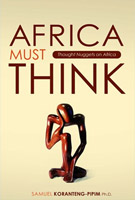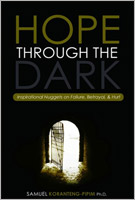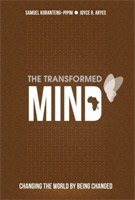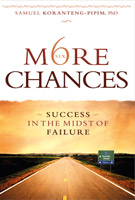Homosexuality Has Come to Church
HOMOSEXUALITY HAS COME TO CHURCH: Should We Embrace It?
Samuel Koranteng-Pipim, Ph.D.
Director, Public Campus Ministries, Michigan Conference
“Some issues are so controversial that confronting them is too painful. Rather than discussing them in an emotionally charged atmosphere, we prefer not to discuss them at all. Other issues are so important that confronting them is necessary even when this is unavoidably painful. We prefer to find an approach to them at almost any cost, including the risk of pain. The issue of homosexuality is, at present and generally speaking, in the first category in the churches and in the second category in society.” —Pim Pronk
Just when I was completing my Must We Be Silent (2001) for publication, I received an e-mail from Joe (pseudonym), a homosexual who claims to be a Seventh-day Adventist (SDA). In a subsequent e-mail, he indicated that his gay partner was not an Adventist but was considering baptism. The purpose of his writing to me was to inquire about the availability of gay friendly Christian groups in the Ann Arbor area where I currently live and about whether or not the Ann Arbor SDA church (or some other SDA church in the area) will offer a gay friendly environment for him and his homosexual male partner. The relevant section of his e-mail reads:
My partner and I will be graduate students at the University of Michigan in January (if all goes as planned!). We are looking for a gay-friendly church to attend, or possibly a gay Christian Bible study group on campus. Do you have contact names for g[ay]-l[esbian and] b[isexual] Christian groups in the area? If the SDA churches in Ann Arbor are not gay-friendly, do you have a list of non-SDA accepting congregations? Also, is there an active Kinship chapter in Ann Arbor? [Kinship is a pro-homosexual group operating within the SDA church] We are looking forward to finding a new church home.
Joe is not alone in his request. Today “Adventist” homosexuals are coming out of the closet and clamoring for acceptance. And in response some of our churches are embracing homosexuals who still cling to that lifestyle. A Winter 1999 issue of Scanner, a newsletter published by the Glendale City SDA Church in California, includes an interview with Donald, a “gay Adventist” who is apparently very active in the church. He is quoted as saying that “going by conservative estimations, there are at least 5,000 gay Adventists in Southern California.”[1] The November 18, 2000 church bulletin of that church even carries an announcement of a homosexual couple “who are celebrating their 14-year anniversary.”
The presence of Adventist homosexuals is not limited to California. There even exists a national organization known as Kinship, which functions, to use its own words, as “a support group for gay and lesbian Seventh-day Adventists.” Its aim is to convert Adventists to its belief that “God can bless a committed homosexual relationship.” They want the church to accept homosexuality as a natural gift from God. The influence of this ideology can be seen and felt on some of our North American SDA college campuses where some students and faculty openly discuss their homosexual or lesbian relationships in the students’ newspapers. [2]
There are also other gay and lesbian “ministries” or support groups, which are operating in the church. While claiming to distance themselves from the pro-gay theology of Kinship, these so-called outreach ministries nonetheless teach that homosexuality is not a sin, but a morally neutral condition that cannot always be “cured.” [3]
Some readers may even be surprised to learn that pro-gay views of Kinship were actively promoted in booth #1109 at the 2000 Toronto General Conference (GC) session. The booth was listed as "Someone to Talk To" in the General Conference Exhibition book given to all delegates to the session. The “Someone to Talk To” organization claims to be for "Adventist Families and Friends of Gays and Lesbians." Its organizers placed a two page advertisement in the GC Exhibition book in which they mentioned that the North American Division Family Ministries Department has recognized their organization. [4]
In an attempt to convince the church to embrace homosexuality as morally acceptable, the above organization passed out hundreds of brochures to the Toronto GC session delegates and visitors. One of their materials explains why:
I hope the church will no longer take an ostrich-in-the-sand approach, but face the reality that its gay brothers and sisters are everywhere in the Church: from congregational laity to college faculty, church pastors and General Conference workers. We are hurting and isolated, and as much in need of denominational acceptance and the forgiving grace of Christ as anyone else. Please don’t continue to ignore us. [5]
The above facts confirm that Joe’s e-mail to me cannot be dismissed as an isolated request. Whether we recognize it or not, homosexuals “are everywhere in the Church” and are calling for “denominational acceptance.” The crucial question therefore is, How should we respond to their calls? Does the church have an official position on the issue?
A satisfactory answer requires a clear understanding of the Bible’s teaching on the nature and morality of homosexuality. This understanding should help us address the question of how to relate or minister to homosexuals. Just in case a reader of this book is wondering about how I responded to Joe’s e-mail, here it is:
Hello Joe:
This is in response to your inquiry about "gay friendly" Christian groups in the Ann Arbor area, and whether or not the Ann Arbor SDA church (or some other SDA church) will offer a "gay friendly" environment for you and your male partner should you decide to relocate to Ann Arbor in January.
To the best of my knowledge the SDA churches in the area uphold Fundamental Belief #22 as well as the Official SDA Statement on Homosexuality. The former reads in part: "Marriage was divinely established in Eden and affirmed by Jesus to be a lifelong union between a man and a woman in loving companionship." The Official Statement reiterates: "Sexual intimacy belongs only within the marital relationship of a man and a woman."
But while as a church we are "opposed to homosexual practices and relationships," the SDA church recognizes that "every human being is valuable in the sight of God, and we seek to minister to all men and women in the spirit of Jesus. We also believe that by God's grace and through the encouragement of the community of faith, an individual may live in harmony with the principles of God's Word." Consequently, we "endeavor to follow the instruction and example of Jesus. He affirmed the dignity of all human beings and reached out compassionately to persons and families suffering the consequences of sin. He offered caring ministry and words of solace to struggling people, while differentiating His love for sinners from His clear teaching about sinful practices" (Official SDA Statement on Homosexuality, 1999).
Consistent with our SDA Fundamental Belief #22 and the Official Statement, you can understand why the Ann Arbor SDA church cannot support an openly gay lifestyle or the activities of Kinship. However, the church is open to all homosexuals who recognize that homosexuality is sin, who are willing to turn away from that lifestyle, and who, by the grace of God, seek to order their lives in accordance with His Word. I am in full agreement with the church’s position.
Joe, I recognize that you may or may not agree with the church's position. But I want to assure you that while my own personal and ethical convictions do not allow me to refer you to any gay group that condones a homosexual lifestyle, I would still be more than willing to assist you in any way possible--such as help in moving, ride from the airport, having you in our home for meals, spiritual counseling or Bible study, etc. as desired.” [6]
Joe graciously responded to my reply. But quite often, those who challenge attempts to reconcile homosexuality with the Christian lifestyle incur the wrath of pro-gay advocates. These Christians are misrepresented as being uninformed, judgmental or uncompassionate legalists. At times, they are caricatured as some right-wing homophobic fundamentalists. It is partly to avoid being so labeled that many Adventist thought leaders have chosen to be silent (or at most ambiguous) on the subject of homosexuality.
Must We Be Silent? There are at least three reasons why the church must not be silent on crucial issues raised by the gay theology. First, it is a betrayal of Christ and His gospel when, for reasons of political expediency, we choose to remain silent or neutral on established biblical teachings that are being undermined.[7] Moreover, since the advocates of homosexuality are freely disseminating their opinions in the church, it is not out of place for Bible-believing Adventists also to express their views on the subject.
Furthermore, the issue of homosexuality is creating some confusion and hurt in the church. On the one hand, those who consider themselves as homosexuals in orientation are hurt because they often feel misunderstood, rejected, and even discriminated against. On the other hand, those who believe that homosexuality is a violation of the teachings and norms of biblical Christianity are also hurt because they feel that the church has betrayed their trust by accommodating itself to the objectionable practice of homosexuality, thereby encouraging and exposing its members to gross sexual deviations. A truly caring church cannot refuse to respond to an issue that is creating so much confusion and hurt. [8]
What the Issue Is Not. The issue to be addressed is not whether homosexuals have legitimate civil rights to practice their lifestyle. Like every other human being, the homosexual is of equal value in God's sight and has the same rights and freedom of choice as all others.
What the Issue Is. The specific issue to be addressed is whether or not homosexuality is compatible with the Christian lifestyle. In other words, are the pro-gay arguments biblically defensible?
While addressing this crucial question, I will attempt to: (1) explain why Adventist attitudes are changing on the issue of homosexuality; (2) summarize the three major options on the church's dealing with homosexuality; (3) briefly respond to some of the main arguments being put forth by those attempting to reconcile their “born a gay” experience with the Bible’s “born again” theology, and (4) point out how we must deal redemptively with homosexuals seeking help to overcome their sin.
Working Definitions. In this article, the term “homosexual” or “gay” will be applied to any person (male or female) who, for whatever reasons (genetic, hormonal, environmental, situational, etc.), either engages in a same-gender sexual activity or has a sexual attraction, preference, desire, fantasy, or lust for, members of the same sex. “Lesbianism” refers to a female homosexual. While a “bisexual” is one who engages in or has an erotic attraction to members of both sexes, a “heterosexual” is a person who practices or has an erotic attraction to members of the opposite sex. Gay or homosexual theology refers to the attempt to make homosexuality compatible with biblical Christianity.
Observe carefully that homosexuality, contrary to the claims by some, is not simply a same gender attraction (SGA). After all, there is often a same gender attraction between a father and a son, a mother and a daughter, a little brother and his older brothers, a little sister and her big sisters, etc. Individuals experiencing such same-gender attractions cannot be correctly termed homosexuals. A same-gender attraction can be rightly termed homosexuality if, and only if, the attraction is sexual or erotic. In the same way, an attraction between a child and an adult is not necessarily pedophilia unless that attraction is sexual or erotic.
From our definition above, homosexuality (regardless of its cause or whether considered constitutional or situational[9]) is a same gender sexual practice and/or an erotic attraction, preference, desire, or lust for members of the same sex. Outward expressions of homosexuality include sexual contact, erotic noncontact behavior (exhibitionism, telephone sex), and the use of pornography. Indirect expressions of homosexuality include such conscious acts of the imagination as lusting and sexual fantasies.
The Forbidden Issue. In order to decide whether or not the Seventh-day Adventist church should embrace the born-a-gay gospel, we must address this crucial question: Is the homosexual orientation/tendency (i.e. sexual attraction, preference, desire, or lust), regardless of its cause (genetic, hormonal, environmental, etc.), a morally neutral mark of a person’s identity which cannot be changed?
The above question is loaded with major theological and ethical concerns that have to do with our interpretation and understanding of the Bible’s teaching. [10]This first section of Must We Be Silent will address these issues.
NOTE: This article is excerpted from the author’s book Must We Be Silent?. The book is available to purchase at www.Berean-Books.org.
[1] Reni Dupertuis, “To Every Nation, Kindred, Tongue and People (Including Sexual Orientation?),” An Interview with Donald J. Freeman, Scanner, Winter 1999, 9-11.
[2] Chapter 3 of the author’s Must We Be Silent documents some of these.
[3] I can think of organizations like GLOW (God’s Love Our Witness) and God’s Rainbow (an Adventist Gay/Lesbian Ministry at San Francisco Central SDA Church which claims official recognition by the Central California Conference). Apparently believing that homosexuality is a mark of a person’s identity (like being born with a particular color of skin, hair, eyes) these “ministries” and support groups teach that being a homosexual is not sin, but (lustful and inappropriate) homosexual activity is sin and therefore, must be avoided. In subsequent pages I will argue that, despite their best intentions, those who hold to this view fail to realize that their position on homosexuality is neither consistent nor biblical.
[4] In his comments on “the inappropriate presentations made in booth1109 at the 2000 Toronto GC session” Howard ‘duke’ Holtz, a member of the Adventist Gay/Lesbian Ministry at San Francisco Central SDA Church, and “originator” of God’s Rainbow, gives some background on how the pro-gay organization managed to get a booth at the GC session. He indicates that the booth was obtained by Carrol Grady, one who appears “to drift towards the Kinship philosophy. . . . Carrol then went and knowingly allowed Kinship members to work the booth for her. This resulted in Kinship having access to a booth to promote their non-Adventist beliefs at the GC session. When Carrol asked me to send her some of our God's Rainbow brochures to hand out, I also expressed my feelings that her actions were not in-line with the goals and standards of our ministry. I have no idea how Carrol could obtain a booth without adhering to SDA principles, and I believe that this is an issue which should be investigated and corrected because incidents like this set back the sincere SDA efforts of such ministries as ours and GLOW's.” See Howard Holtz’s Internet comments, “End-Time Issues: Homosexuality and the SDA Church,” October 30, 2000; http://www.sdanet.org/archive/2000/Oct32000/0323.html. While distancing itself from Kinship, both Holtz’s own God’s Rainbow and the GLOW organization he highly recommends maintain that homosexuality is morally neutral. In fact GLOW holds that homosexuality is not sin, and that homosexuals cannot be "cured" of their homosexuality.
[5] Mark Edwards (pseudonym), “My World,” 2, document distributed in booth #1109 at the 2000 Toronto GC session. The booth was listed in the GC Exhibition book as "Someone to Talk To," an organization claiming to be for "Adventist Families and Friends of Gays and Lesbians."
[6] The official Seventh-day Adventist statement on homosexuality was voted during the Annual Council of the General Conference Executive Committee on Sunday, October 3, 1999, in Silver Spring, Maryland. It reads in its entirety:
“The Seventh-day Adventist Church recognizes that every human being is valuable in the sight of God, and we seek to minister to all men and women in the spirit of Jesus. We also believe that by God's grace and through the encouragement of the community of faith, an individual may live in harmony with the principles of God's Word.
“Seventh-day Adventists believe that sexual intimacy belongs only within the marital relationship of a man and a woman. This was the design established by God at creation. The Scriptures declare: ‘For this reason a man will leave his father and mother and be united to his wife, and they will become one flesh’ (Gen. 2:24, NIV). Throughout Scripture this heterosexual pattern is affirmed. The Bible makes no accommodation for homosexual activity or relationships. Sexual acts outside the circle of a heterosexual marriage are forbidden (Lev. 20:7-21; Rom. 1:24-27; 1 Cor. 6:9-11). Jesus Christ reaffirmed the divine creation intent: ‘Haven't you read,’ he replied, ‘that at the beginning the Creator made them male and female,’ and said, ‘For this reason a man will leave his father and mother and be united to his wife, and the two will become one flesh? So they are no longer two, but one’ (Matt. 19:4-6, NIV). For these reasons Adventists are opposed to homosexual practices and relationships.
“Seventh-day Adventists endeavor to follow the instruction and example of Jesus. He affirmed the dignity of all human beings and reached out compassionately to persons and families suffering the consequences of sin. He offered caring ministry and words of solace to struggling people, while differentiating His love for sinners from His clear teaching about sinful practices” (The official Seventh-day Adventist statement on homosexuality was voted during the Annual Council of the General Conference Executive Committee on Sunday, October 3, 1999, in Silver Spring, Maryland).
[7] I am aware that, in today’s climate of theological pluralism, it is almost suicidal for anyone to speak out against homosexuality and other disputed theological or ethical issues. Already, in certain quarters of the church, those who forthrightly express their views on such issues as racism or tribalism, women’s ordination, contemporary higher criticism, homosexuality, and worship styles are considered "divisive," “controversial” and “extreme fundamentalists.” For my views on some of the issues, see my “Saved by Grace and Living by Race: The Religion Called Racism,” Journal of the Adventist Theological Society 5/2 (Autumn 1994): 37-78; Searching the Scriptures: Women’s Ordination and the Call to Biblical Fidelity (Berrien Springs, MI: Adventists Affirm, 1995); Receiving the Word: How New Approaches to the Bible Impact Our Biblical Faith and Lifestyle (Berrien Springs, MI: Berean Books, 1996).
[8] Cf. Richard J. Foster, The Challenge of the Disciplined Life: Christian Reflections on Money, Sex and Power (San Francisco: Harper and Row, 1985), 107.
[9] It should also be noted that in the literature on homosexuality, a distinction is often made between “constitutional” and “situational” homosexuals. “Constitutional” or “true” homosexuals (also referred to as “inverts” or “ontological” homosexuals) are those who are believed to have been born gay, and therefore, are considered to be the genuine homosexuals. Because their condition/orientation is said to be a permanent part of their constitutional make up (and not a transitory phase of life nor an accommodation to situational pressure), it is maintained that those who are “ontological” homosexuals should not be held morally responsible for their condition. In and of itself, homosexual orientation is believed to be morally neutral, like the normal condition of heterosexuality. On the other hand, “situational” homosexuals (also referred to as “perverts”) are not considered as true homosexuals but as heterosexuals who are forced by circumstances (e. g., restrictions on their sexual expression, such as is the case in prison, military camps, boarding schools, monasteries, and other single sex environments) to resort to homosexual practices to gratify their sexual needs. Because situational homosexuality is believed to be a transitory phase in their lives (i. e. they are forced to engage in homosexual practices merely to accommodate situational pressure), their homosexuality is regarded as a perversion of true sexuality; those who engage in these practices are culpable for their actions. See D. S. Bailey, Homosexuality and the Western Christian Tradition (London/New York: Longmans, Green, 1955), xi; H. K. Jones, A Christian Understanding of the Homosexual (New York: Association Press, 1966), 20-23.
[10] At issue is the authority of Scripture and the relevance of the biblical text for every generation. “If one discounts the authority of Scripture and its relevance, it matters little what the Bible says about homosexuality or any other subject. If, on the one hand, one holds Scripture in high regard and accepts it as the inspired Word of God, it must be allowed to judge the conduct of every individual. Principles of moral conduct should not change with time or place, contrary to the doctrines of situation ethics common in our day” (Donald J. Wold, Out of Order: Homosexuality in the Bible and the Ancient Near East [Grand Rapids, MI: Baker Books, 1998], 9).









